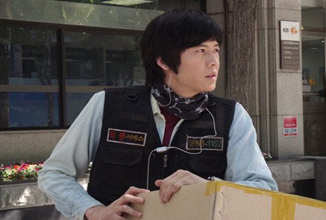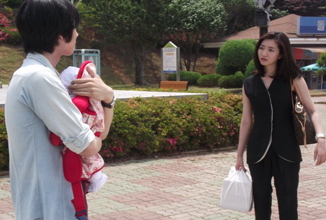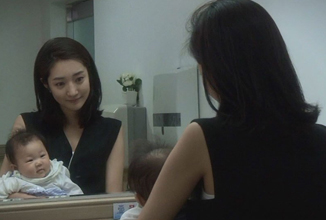"I always knew I'd regret it, so I have no regrets."
Synopsis:
Chul-su (Park Il-mok) is a motorcycle courier who is instructed by his boss to travel to Yeosu, find the family of a deceased homeless man and deliver his cremated remains to them even though doing so will result in him missing his own father's memorial the following day. After making his apologies and excuses to his family by phone, Chul-su sets off on his journey inadvertently taking the same route as an incredibly anxious young woman, Mi-jin (Go Joon-hee), who is travelling with a baby.
Finally arriving in Yeosu late at night, Chul-su falls asleep in the bus terminal awakening the following morning to discover not only have the homeless man's ashes gone missing but also that the aforementioned baby has been left in their place.
Thus begins a journey of a different kind for Chul-su; a search to find Mi-jin, discover why she abandoned the baby, ascertain if she is even the child's real mother and hopefully deliver the ashes to the homeless man's family in the process...
Review:
From the very moment we are first introduced to Chul-su, we are brought 'slap, bang' face-to-face with his day-to-day life of clashing responsibilities and ever-increasing pressures brought on by both society's requirements and others' expectations. His job demands commitment and a willingness to set aside personal matters; his family expect him to play the dutiful role as main male familial figure; and society fully expects him to juggle all of the above in order to be considered a fine, upstanding member of the community.
Problem is, the majority of the numerous requirements placed on Chul-su are mutually exclusive making it all but impossible for him to come even close to pleasing all of the people all of the time; instead more often than not pleasing none and thereby repeatedly appearing wanting.
There is more than one mention in Yeosu's narrative of Chul-su having originally decided to become a motorcycle courier because of his love of motorbikes and, to my mind at least, the fact that for save for an extremely short single scene at the beginning of the film he is only ever seen walking or using public transport subtly underlines the implication that in all his striving to be the adult he is expected to be his personal desires, loves, hopes and dreams will always suffer most of all.
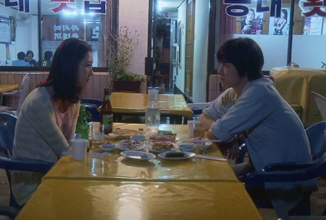 |
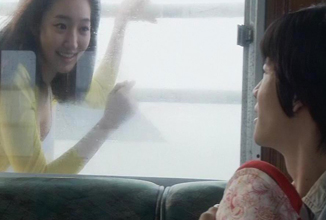 |
While, of course, being a young woman in Korea means the expectations placed on Mi-jin are somewhat different to those faced by Chul-su, the overall fallout to her personally has similar traits. Her need to secure finances to continue her college education sitting at odds with society's classic assumed female 'goal' of family requiring her to sacrifice her wants, needs (and even herself) for the needs of a significant other and the perceived good of society at large, Mi-jin's (outwardly) feisty character stands as the personification of the changing place of women within Korean society over the years - especially when contrasted with the accepting attitude of the elderly lady who Chul-su and Mi-jin deliver the ashes to - and as such Mi-jin has been, and is, far less willing to just accept situations than Chul-su.
In fact, so great is her subconscious need to take a stand that it pushes her agree to be a surrogate mother for a fee, becoming pregnant out of wedlock; thereby - she believes - allowing her to show herself to be an individual who determines her own fate at the same time as providing the money she needs to secure a better future for herself, and even, perhaps, giving her an opportunity to silently say that she'll let no-one dictate what she can or cannot do under any circumstances.
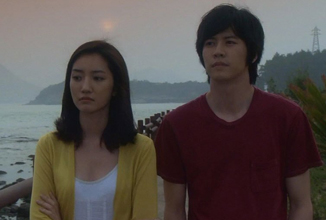 |
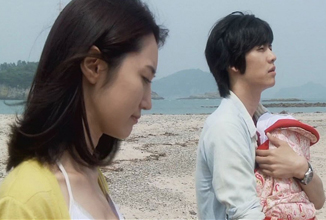 |
However, even though Mi-jin was fully aware that she would ultimately regret the decision she was nonetheless determined to make, what she failed utterly to take into account was the very thing that makes her who she is at her core - her femininity - and she could never have foreseen how maternal instincts she didn't even know she had would not only change her desires and perceptions but also show her - at least partly - to be the woman society always insisted she was and should strive to be.
It could be said that the meeting and interactions of Chul-su and Mi-jin are almost meant to be: Both are part of the younger generation and neither have been able to live as they would wish to (as Mi-jin says "There is just no way for young people to achieve their dreams") but every scene in which they are together positively screams of the essence of Yeosu's narrative:
That essence is the statement that no matter how harsh life sometimes appears and regardless of how difficult the sharing of problems may be, share them we must if we are to discover the answers within ourselves that a lone individual could never hope to find.
Yeosu is a presentation by the Korean Ministry of Culture, Sport and Tourism and Arirang TV and this is not the first time these institutions have collaborated on a film detailing narratives set in different beautiful areas of Korea (for example: they also collaborated with KOFIC to produce The Trip (2009), set on Jeju Island).
The stunningly beautiful surroundings of Yeosu provide a perfect backdrop to the film's storyline and naturally serve as the haven the characters need so badly to finally find themselves; far from the hustle and bustle of cities that never sleep. As such, the cinematography produces some staggeringly arresting visuals that deftly balance the darker elements of the storyline, repeatedly accenting them in the process.
Ultimately, when Chul-su and Mi-jin set out they have a difficult, cathartic journey to make and the utterly gorgeous, and gently apt, area of Yeosu provides the ideal place to undertake it.
Cast:
Yeosu featuring only two main characters and a couple of supporting roles allows a great deal of depth to be given to the stories of Chul-su and Mi-jin; making the entire narrative content and underlying themes noticeably stronger as a result.
Both Park Il-mok (Chul-su) and Go Joon-hee (Mi-jin) have incredible chemistry together allowing for a number of (always beautifully understated) moments of quiet humour to bring some gentle light to the darker sections of the narrative. Both give exemplary performances throughout with Go Joon-hee given somewhat more of an opportunity to portray a varied range of emotions; her portrayal of Mi-jin thereby being ever so slightly more memorable.
As already stated, the rest of the cast play far smaller supporting roles but all perform admirably.
Cast: Park Il-mok, Go Joon-hee, Jung Eui-chul
Summary:
The stunningly beautiful surroundings of Yeosu provide the perfect backdrop to the cathartic journey of a young man and woman who are both desperately searching to understand and come to terms with their lives and choices. Visually stunning; narratively deep, Yeosu infuses its gently gripping story with intelligent, thought-provoking social commentary and critique throughout.
DVD
The DVD edition reviewed here is the Korean (Region 3) Art Service Limited Edition First Press version. The film itself is provided as an anamorphic transfer with an aspect ratio of 1.85:1 and there are no image artifacts (and no ghosting) present.
The original Korean language soundtrack is provided as Dolby Digital 2.0 and is well balanced throughout.
Excellent subtitles are provided throughout the main feature but English-speaking viewers should note that, as with many Korean DVD releases, there are no subtitles available on any of the extras.
DVD Details:
- ‘Yeosu’
- Director: Jin Kwang-gyo
- Language: Korean
- Subtitles: English, Korean
- Country: South Korea
- Picture Format: NTSC
- Disc Format: DVD (One Disc)
- Region Code: 3
- Publisher: Art Service
DVD Extras:
- Trailer
|


